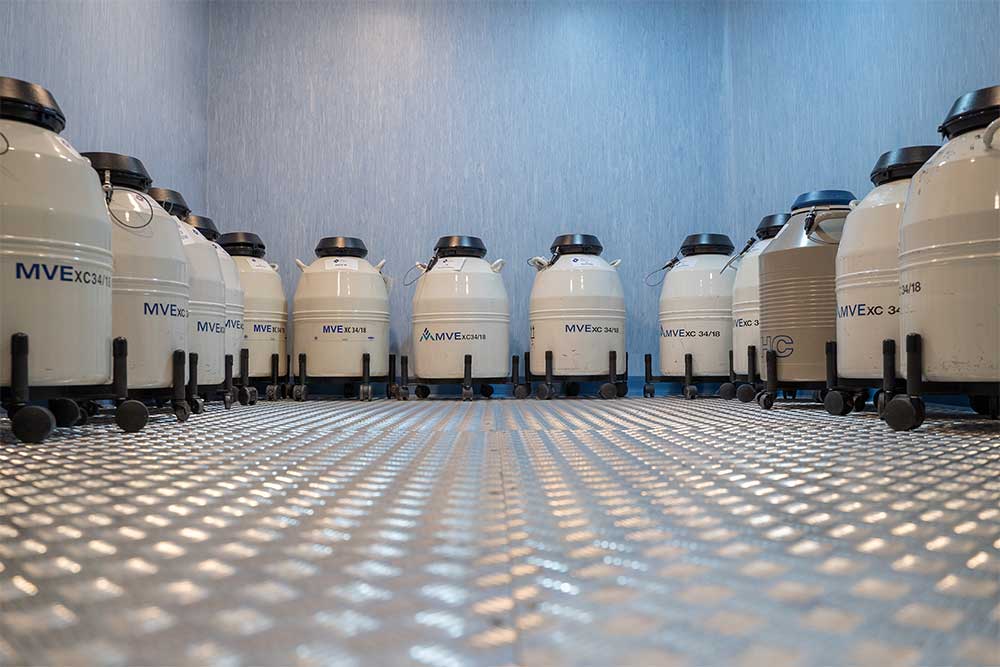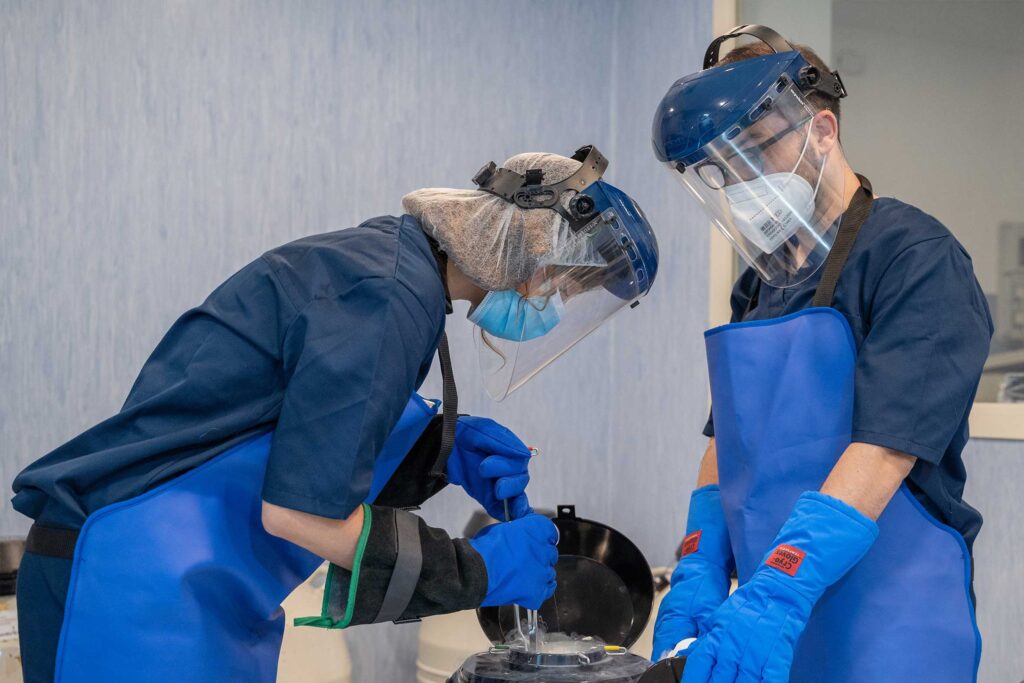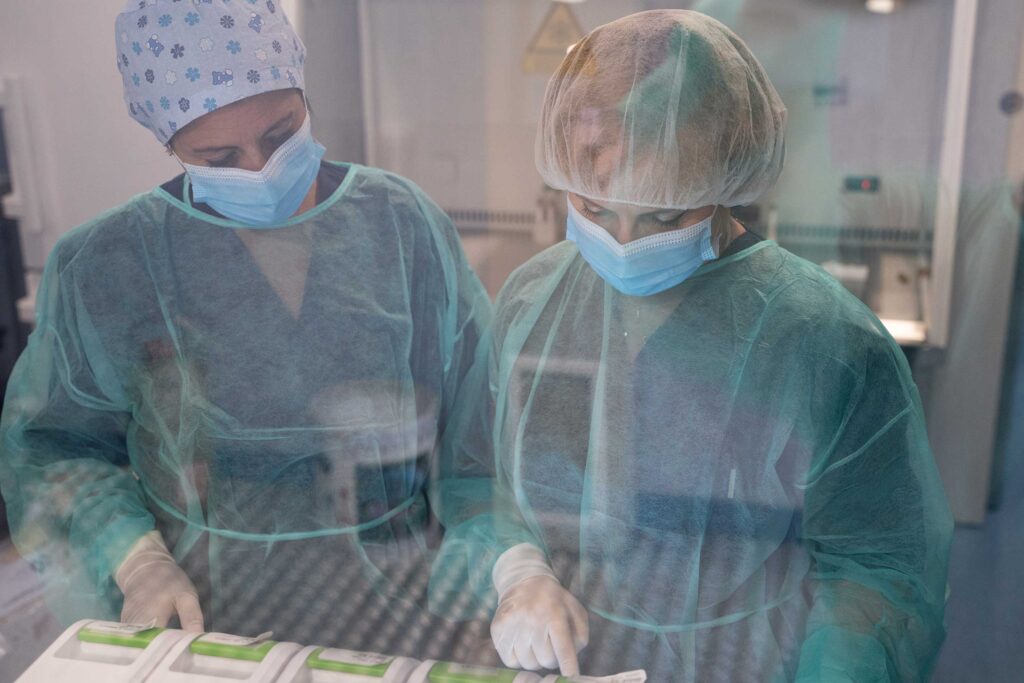Gamete Donation
Gamete donation is a Medically Assisted Procreation (MAP) treatment through which donated gametes are used to enable couples who are eligible for heterologous fertilization to achieve pregnancy.
In heterologous fertilization, in fact, the oocytes or sperm used belong to completely anonymous donors, just as the so-called recipients remain anonymous. Donation of gametes is a voluntary act and both men and women are rigorously screened for genetic and infective diseases before they are allowed, and recruited, to donate.
Gamete donation is a highly sensitive gesture, as it enables so many couples to realize their dream: to become parents.
Contact us now to find out more!
Our services
Are you thinking of embarking on an assisted reproduction journey? The first step is to book a consultation with our professionals. Every story is unique and therefore every single patient – as well as every couple – is invited to talk about their journey and their goals, in order to evaluate together what are the steps to take for a totally personalized assisted reproduction process.
With a simple blood sample we carry out hormonal analysis, i.e. the monitoring of your hormone levels in the blood. Through this examination we can identify hormonal imbalances, understand the cause and intervene with the right remedies.
Ovulation monitoring takes place through a series of transvaginal ultrasound scans and has a dual function:
✔on the one hand it’s used to check that ovulation happens
✔on the other hand it’s useful to increase the chances of conception with targeted intercourse
This examination is essential for all couples who decide to plan a pregnancy, but also for women who undergo ovulation induction therapies.
The spermogram is the first laboratory test a man should undergo when infertility is suspected in the couple. It is a diagnostic test to analyze seminal fluid to evaluate the quality, number, shape and motility of spermatozoa. A spermogram is useful not only for diagnosing the state of infertility, but also as an examination for the prevention of possible pathologies.
IVF was first used over 40 years ago and upto date has led to the birth of over 10 million babies worldwide. This technique is the core procedure for ART
and involves immersing the womans eggs in a drop of culture medium containing spermatozoa of the partner. The fertilized eggs are then left to develop
in culture for upto 5 days and then subsequently transferred
into the womans
uterus with a
fine soft plastic cannula.
Heterologous fertilization is a medically assisted procreation technique which is used in couples with impaired gamete function. In this technique one, or both, of the gametes are replaced by gametes from an external donor.
Egg donation is the donation of eggs by a woman to another woman. This assisted fertilization technique takes place in complete anonymity, to respect the privacy of both the donor and the recipient. Choosing to donate your own oocytes is an act of great sensitivity, as it allows many couples to make their dreams come true. In fact, many women, due to pathologies, treatments such as chemotherapy or radiotherapy or age, have problems with their oocytes and today, fortunately, they can resort to egg donation. Eggs can be donated by healthy young women who are free from hereditary diseases. Egg donation is a gift, a gesture of solidarity, by which many women have conceived and given birth to their long wanted child.
Sperm donation is a voluntary act that allows men to donate their sperm so that it can be used in assisted reproduction techniques, helping many couples who are unable to have children. Sperm donation, like egg donation, takes place completely anonymously and not before the donor has undergone a series of genetic tests to avoid the risk of hereditary diseases. The sperm itself undergoes a period of quarantine in which it is ensured that there are no sexually transmitted diseases present.
Egg donation and sperm donation are completely anonymous and volountary gestures from men and women to give couples, with gamete defects, the opportunity to procreate. Donors undergo a series of tests, which include hereditary diseases and sexually transmitted diseases before donating their gametes.
Miscarriage is the most frequent cause of pregnancy loss. Where two consecutive episodes of abortion occur in a woman within the 20th week of pregnancy then the term recurrent miscarriage is used. In these cases, it is necessary to carry out genetic and infective tests to understand the possible causes. The two strategies used to reduce this phenomenon are the study of the endometrium and physiology of the woman and study of the chromosomal complement of the embryo using PGT.
When choosing to embark in ART, both partners need psychological support. In fact, we must not underestimate the effect that stress can have, not only in the presence of any IVF failure, but also during the entire period of examinations and treatments to which one undergoes before the transfer. At CFA, our patients are supported by our pscychologists from the first consultation to the realization of their dream of parenthood.
Are you thinking of embarking on an assisted reproduction journey? The first step is to book a consultation with our professionals. Every story is unique and therefore every single patient – as well as every couple – is invited to talk about their journey and their goals, in order to evaluate together what are the steps to take for a totally personalized assisted reproduction process.
With a simple blood sample we carry out hormonal analysis, i.e. the monitoring of your hormone levels in the blood. Through this examination we can identify hormonal imbalances, understand the cause and intervene with the right remedies.
Ovulation monitoring takes place through a series of transvaginal ultrasound scans and has a dual function:
✔on the one hand it’s used to check that ovulation happens
✔on the other hand it’s useful to increase the chances of conception with targeted intercourse
This examination is essential for all couples who decide to plan a pregnancy, but also for women who undergo ovulation induction therapies.
The spermogram is the first laboratory test a man should undergo when infertility is suspected in the couple. It is a diagnostic test to analyze seminal fluid to evaluate the quality, number, shape and motility of spermatozoa. A spermogram is useful not only for diagnosing the state of infertility, but also as an examination for the prevention of possible pathologies.
IVF was first used over 40 years ago and upto date has led to the birth of over 10 million babies worldwide. This technique is the core procedure for ART
and involves immersing the womans eggs in a drop of culture medium containing spermatozoa of the partner. The fertilized eggs are then left to develop
in culture for upto 5 days and then subsequently transferred
into the womans
uterus with a
fine soft plastic cannula.
Heterologous fertilization is a medically assisted procreation technique which is used in couples with impaired gamete function. In this technique one, or both, of the gametes are replaced by gametes from an external donor.
Egg donation is the donation of eggs by a woman to another woman. This assisted fertilization technique takes place in complete anonymity, to respect the privacy of both the donor and the recipient. Choosing to donate your own oocytes is an act of great sensitivity, as it allows many couples to make their dreams come true. In fact, many women, due to pathologies, treatments such as chemotherapy or radiotherapy or age, have problems with their oocytes and today, fortunately, they can resort to egg donation. Eggs can be donated by healthy young women who are free from hereditary diseases. Egg donation is a gift, a gesture of solidarity, by which many women have conceived and given birth to their long wanted child.
Sperm donation is a voluntary act that allows men to donate their sperm so that it can be used in assisted reproduction techniques, helping many couples who are unable to have children. Sperm donation, like egg donation, takes place completely anonymously and not before the donor has undergone a series of genetic tests to avoid the risk of hereditary diseases. The sperm itself undergoes a period of quarantine in which it is ensured that there are no sexually transmitted diseases present.
Egg donation and sperm donation are completely anonymous and volountary gestures from men and women to give couples, with gamete defects, the opportunity to procreate. Donors undergo a series of tests, which include hereditary diseases and sexually transmitted diseases before donating their gametes.
Miscarriage is the most frequent cause of pregnancy loss. Where two consecutive episodes of abortion occur in a woman within the 20th week of pregnancy then the term recurrent miscarriage is used. In these cases, it is necessary to carry out genetic and infective tests to understand the possible causes. The two strategies used to reduce this phenomenon are the study of the endometrium and physiology of the woman and study of the chromosomal complement of the embryo using PGT.
When choosing to embark in ART, both partners need psychological support. In fact, we must not underestimate the effect that stress can have, not only in the presence of any IVF failure, but also during the entire period of examinations and treatments to which one undergoes before the transfer. At CFA, our patients are supported by our pscychologists from the first consultation to the realization of their dream of parenthood.



